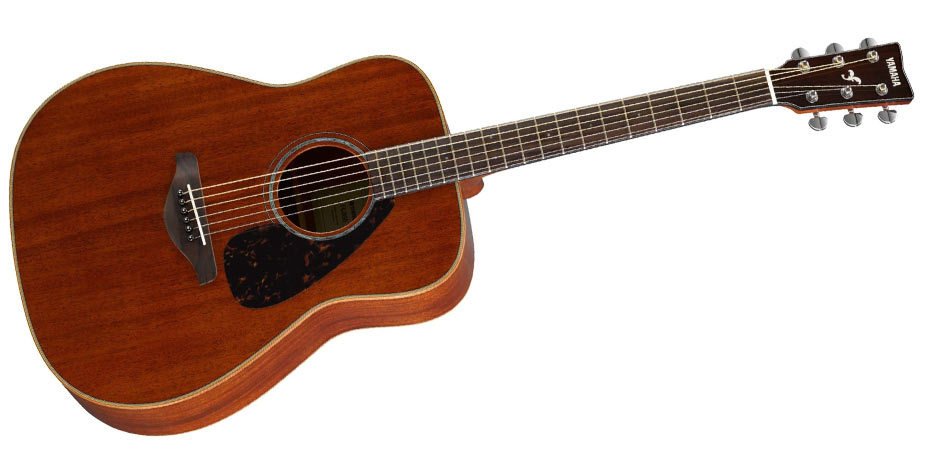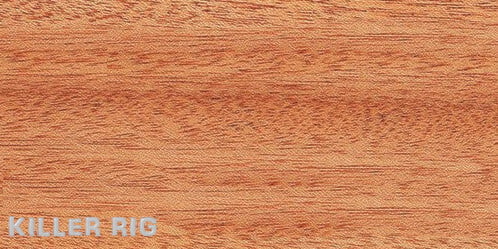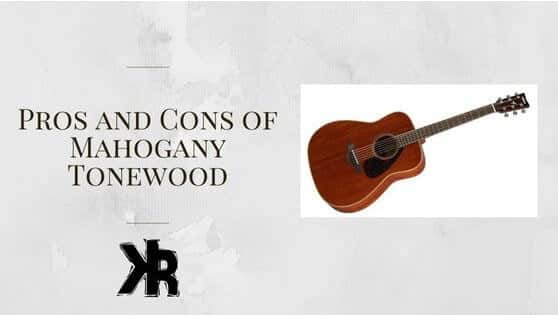Table of Contents
Mahogany as a Tonewood
So what exactly is mahogany, and where in the world does it come from?
Mahogany is a type of hardwood that is used in the construction of acoustic and electric guitars. The tree that mahogany comes from is indigenous to South America. But also Central America, and Africa.
Mahogany has been used as a tonewood in the construction of guitars for a long time. It is prized for its dark, rich tone and incredible durability.
To see all the different guitar tone woods, click here!
Pros of Mahogany Guitars
Because mahogany is a popular wood choice for making guitars, it has many benefits.
- The rich, warm sound of mahogany is perfect for many genres of music like jazz, blues, rock, and metal.
- Mahogany guitars have good sustain, due to the hardness of the wood. As such, rock and metal players prefer this wood type, especially for lead and solo parts.
- It’s a very strong and durable material, resistant to dents, so your guitar will last for many years. It will also handle environmental changes quite well and won’t crack like other types.
- This wood is often used in high-end guitars, so you know you’re getting a quality instrument. This depends on the manufacturer and the model of the guitar. But also the hardware included with the instrument.
- Mahogany is a beautiful wood. There are many acoustic guitars that look great when a skilled builder is able to finish them.
- It’s a great wood for guitar necks, as it’s strong enough to deal with string tension and is less likely to warp.

Cons of Mahogany Guitars
Mahogany is a top choice wood for both acoustic and electric guitars, but it does have some drawbacks.
- The weight of mahogany can make guitars difficult to wear on a strap for long periods of time. Electric guitars with mahogany solid bodies weigh nearly 12 pounds!
- It’s a darker-sounding tone wood, and as such, it lacks the presence or brightness found in other types. This is especially evident in acoustic guitars made entirely of mahogany.
- The hardness of mahogany can make the guitar more prone to feedback at high volumes. This is especially true with hollow-body guitars.
- Mahogany doesn’t make a good fretboard material, as it’s too porous.
- It’s hardwood, so it can be difficult to work with if you’re not experienced.
- The price of mahogany over other types is higher. As a result, the cost of guitars made with the material will also be higher.
The Tone of Mahogany in Acoustic Guitars
Characterized by a warm, rich sound, mahogany emphasizes the midrange frequencies, making it especially favorable for rhythm players who use acoustic guitars.
This tonewood offers a natural compression effect, which smooths out the highs and lows, resulting in a balanced, even tone.
Ideal for genres like blues, folk, and country, mahogany acoustic guitars provide a sound that is full-bodied yet not overly bright, making it a versatile choice for both studio recordings and live performances.
The wood’s density contributes to good sustain, while its porous nature imparts a certain softness to the tone, differentiating it from brighter woods like spruce or maple.
Mahogany Guitars and Age

Mahogany guitars have been around for a long time. Some guitarists believe that they’ve only gotten better with age. It’s a very dense wood.
This means it’s not as responsive to changes in temperature and humidity. This density also makes mahogany guitars more resistant to warping over time.
Some guitarists believe that mahogany guitars can sound a bit dull. That they lack the sparkle of other woods.
This is often due to the fact that mahogany is such a dense wood. It doesn’t vibrate as readily as others, which can lead to a less lively sound.
As the wood ages, some players have said that they feel like the sound of mahogany guitars opens up.
That the instrument becomes more responsive to their touch. They don’t become brighter, but they get louder and richer in timbre. This is unique and very enjoyable.
Check out our comparison of alder vs mahogany here!
Mahogany Vs Other Woods
When it comes to tone, there is no clear consensus on whether mahogany or other woods are better.
It really comes down to personal preference. That said, mahogany is often used in acoustic guitars that are meant to have a warm, round sound. Such as jazz and blues guitars.
If you’re looking for a guitar that has a bit more snap and sparkle, you might want to try something else. Maple is a popular choice for electric guitars. This is because it gives the instrument a bright, cutting tone.
Some popular mahogany electric guitars include the Gibson Les Paul and Fender Stratocaster.
Both of these instruments have been around for decades. They’re still some of the most sought-after guitars on the market.
Conclusion
There are pros and cons to every type of guitar, and mahogany is no exception. Ultimately, it comes down to your preference.
If you’re looking for a darker tone, then a mahogany guitar might be the right choice for you. If you prefer a brighter sound, then you might want to try something else.

